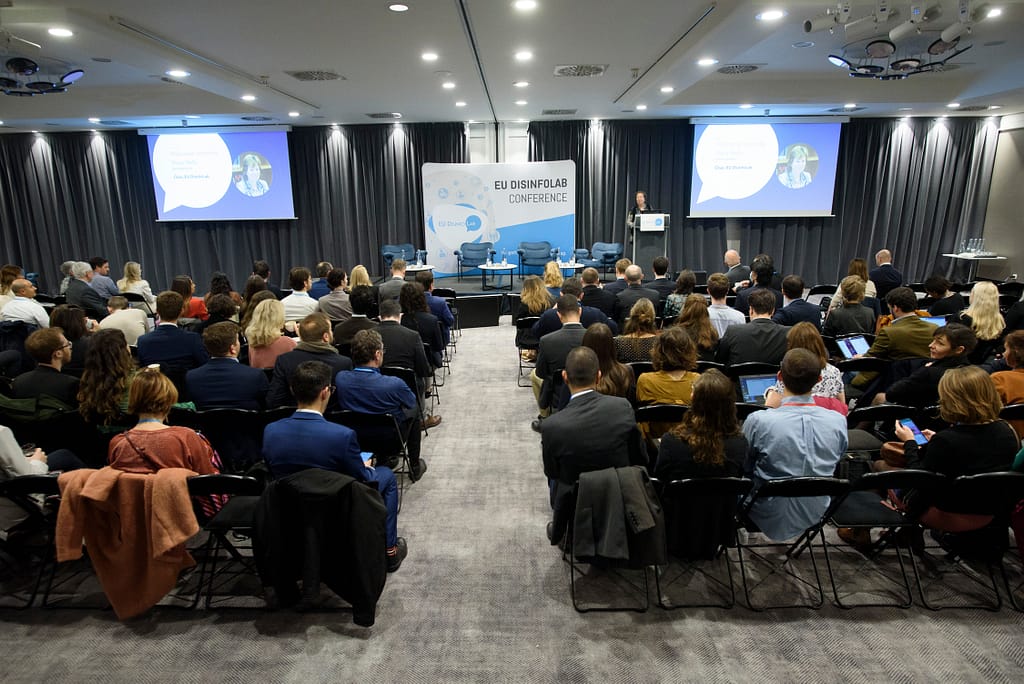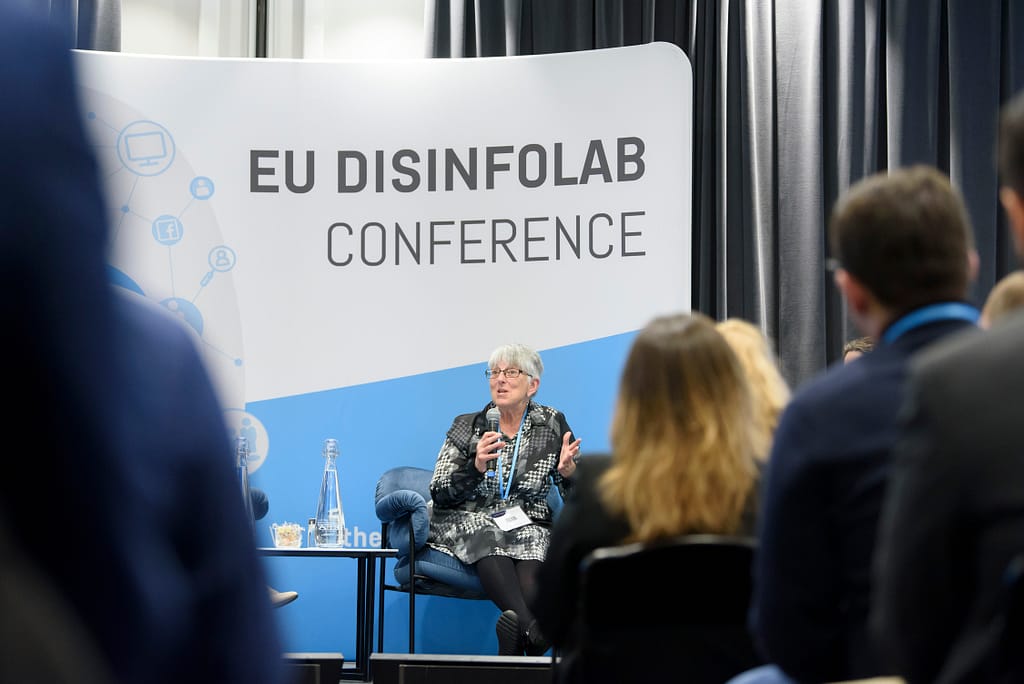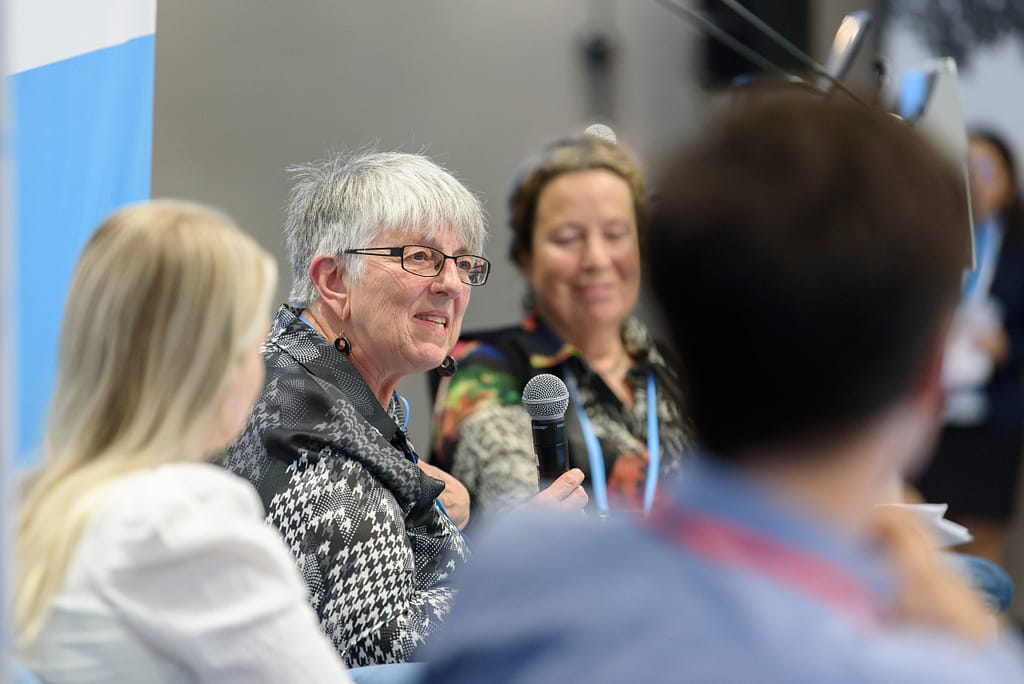#DISINFO2022: Thank you for joining us!
The EU DisinfoLab 2022 Annual Conference took place on 25 & 26 October, 2022. Getting together in real life over two days, sharing experiences on disinformation amongst our community was a privilege. We’re left inspired and grateful by your energy and enthusiasm! We hope you’ve enjoyed the event’s programme, networking opportunities and side events.
Conference materials, including our Conference dossier, slide decks and a picture selection from this conference, can be found on this page below. The recordings from some of our sessions are available on our YouTube channel!
You can now mark your calendars: #Disinfo2023 will take place in Krakow, Poland, on 11 & 12 October, 2023!
conference SPEAKERS
During those two days, the conference brought together renowned experts from diverse backgrounds, digging into pressing issues in the disinformation space, from developments in the field of open-source investigations, and in the policy domain (the Digital Services Act), through the framework of accountability.
By attending this physical event, you joined leading experts and stakeholders from across the disinformation world for a mix of panel sessions, interviews, and masterclasses, including:
Dr. Raed Arafat, Secretary of State – Head of Department of Emergency Situations, Ministry of Internal Affairs, Romania;
Neil Datta, Executive Director, European Parliamentary Forum for Sexual & Reproductive Rights;
Christophe Deloire, General Secretary and Executive Director, Reporters Without Borders, and Chair, Information Democracy Forum;
Lucina Di Meco, Co-Founder, #ShePersisted;
Lutz Güllner, Head of Strategic Communications, European External Action Service (EEAS);
Věra Jourová, Vice-President of the European Commission for Values and Transparency;
Ľuboš Kukliš, Chief Executive, Slovak Council for Media Services, Chair, European Platform of Regulatory Authorities (EPRA);
Clare Melford, Co-Founder & CEO, The Global Disinformation Index (GDI);
Trisha Meyer, Assistant Professor of Digital Governance and Participation, Vrije Universiteit Brussel;
Prof. Rasmus Kleis Nielsen, Director, Reuters Institute for the Study of Journalism; Professor of Political Communication, University of Oxford;
Elise Thomas, Senior OSINT Analyst, Institute for Strategic Dialogue (ISD);
Julie Ward, former MEP.
CONFERENCE PROGRAMME
Have a look at the #Disinfo2022 conference programme below. PDF version available here.
You can find the slide decks from most presentations and masterclasses in the programme below. Replays from most sessions are available from our YouTube channel.
TUESDAY, OCTOBER 25
On the first floor, next to the conference room.
- Diana Wallis, Chair, EU DisinfoLab
- Interview of disinformation victims with Julie Ward, former MEP
- Vaccination and disinformation by Dr. Raed Arafat, Secretary of State, Head of the Department for Emergency Situations, Ministry of Internal Affairs, Romania
- Anti-abortion disinformation: Coordinated oligarchs and religious groups by Neil Datta, Executive Director, European Parliament forum for Sexual and Reproductive Right
On the first floor, next to the conference room.
The widespread use and development of OSINT techniques in the context of the war have proven its potential for countering dis- and misinformation, and documenting war crimes, among others. What have we learnt and is it enough to bring accountability?
Chair: Inês Narciso, Researcher, MediaLab, ISCTE-IUL
- Benjamin Strick, Investigations Director, Centre for Information Resilience
- Elise Thomas, Senior OSINT Analyst, Institute for Strategic Dialogue
OSINT tools are widely available, and many are eager to use them for good. But with great power comes great responsibility.
- Aiganysh Aidarbekova, Open-Source Investigator, Bellingcat – Slides available here
On the first floor, next to the conference room.
Recent investigations have shown how the Internet infrastructure is a new frontline to counter disinformation. Domain name abuses, registrars, servers, this infrastructure is central in accessing information. What do we know about it? Is there accountability in the field? Can we sanction and imagine future policies to prevent malicious actors from abusing it?
Chair: Emma Le Mesurier, Managing Director, Next Level Initiatives
- Kevin Limonier, Associate Professor in Slavic studies and geopolitics. Specialized in geopolitics of the Russian-speaking cyberspace, Université Paris VIII – Slides available here
- Alexandre Alaphilippe, Executive Director, EU DisinfoLab – Slides available here
Disinformation has many universal elements. It is also versatile and adapts to its surrounding context. What is the state of the art in different EU countries?
Chair: Carlos Hernandez-Echevarria, Head of Public Policy & Institutional Developement, Maldita.es
- Thanos Sitistas, Senior Editor, Ellinika Hoaxes – Slides available here
- Jelena Berković, Senior Advisor, Faktograf – Slides available here
- Hanna Linderstål, CEO, Earhart Business Protection Agency and newly started Earhart Academy – Slides available here
- Denis Teyssou, Medialab R&D Editorial Manager, AFP – Slides available here
On the first floor, next to the conference room.
From ‘traditional media’ and tabloids to citizen journalists and influencers, how can we ensure that all actors in our media system are responsible and accountable?
Chair: Susan Morgan, Independent Consultant
- Ľuboš Kukliš, Chief Executive, Slovak Council for Media Services, Chair, European Platform of Regulatory Authorities (EPRA)
- Prof. Rasmus Kleis Nielsen, Director, Reuters Institute for the Study of Journalism; Professor of Political Communication, University of Oxford
- Christophe Deloire, Secretary General, Reporters without borders, and Chair, Forum on Information and Democracy
- Věra Jourová, Vice-President of the European Commission for Values and Transparency, followed by a Q&A led by Diana Wallis, Chair, EU DisinfoLab
You will be notified by email once registrations open, on 14 October.
WEDNESDAY, OCTOBER 26
On the first floor, next to the conference room.
The more everyone talks about ‘disinformation’, the more clear and functional definitions matter in this space. How do different stakeholders and platforms define disinformation, and how does this affect their approach and our collective effort?
Chair: Lutz Güllner, Head of Division for Strategic Communications and Information Analysis, European External Action Service
- Olga Belogolova, Policy Lead, Influence Operations, Meta – Slides available here
The techniques and tactics of disinformation actors and the spread of misinformation vary in different online settings. How do different service providers perceive and mitigate these challenges?
Chair: Isabelle Arnson, Senior Policy Analyst, Tech Against Terrorism
- Dimitar Dimitrov, EU Policy Director, Wikimedia – Slides available here
- Bri Riggio, Platform Policy Manager, Discord Inc.
- Laura Seritti, Head of Public Policy Brussels, Snap
Chair: Maria Giovanna Sessa, Senior Researcher, EU DisinfoLab
- Lucina Di Meco, Co-Founder, #ShePersisted
On the first floor, next to the conference room.
- Clare Melford, CEO, Global Disinformation Index – Slides available here
Is it possible to make an algorithm accountable? (We certainly hope so!) But how do we monitor and enforce this in practice?
Chair: Mathias Vermeulen, Director, AWO
- Nelly Pailleux, Chief Knowledge Officer, Check First – Slides available here
- Marc Faddoul, Co-Director, Tracking Exposed – Slides available here
- John Albert, Policy and Advocacy Manager, Algorithm Watch – Slides available here
On the first floor, next to the conference room.
How sure are we that labelling disinformation is effective? What about deplatforming? We will dive into some of our assumptions and look critically at what we know and what we are missing.
Chair: Laura Smillie, Policy Analyst, European Commission
- Hella-Franziska Hoffmann, Technical Programme Manager, Logically – Slides available here
- Clement Wolf, Head of Information Quality Policy, Government Affairs and Public Policy, Google
- Prof. Stephan Lewandowsky, Professor in Cognitive Science, University of Bristol – Slides available here
- Rita Jonusaite, Advocacy Coordinator, EU DisinfoLab – Slides available here
On the first floor, next to the conference room.
“Web3”, “The Metaverse”, “Synthetic Media”. What do all these buzzwords actually mean, and what are their concrete implications for the fight against disinformation?
Chair: Gregory Rohde, Board Member, EU DisinfoLab
- Sam Gregory, Programme Director, Witness
- Dr. Inga Trauthig, Senior Research Fellow, University of Texas, Austin
- Trisha Meyer, Assistant Professor of Digital Governance and Participation, Vrije Universiteit Brussel
- Diana Wallis, Chair, EU DisinfoLab
CONFERENCE MATERIALS
Most sessions of #Disinfo2022 were recorded. Head to our YouTube account to watch the replays! You can find some presentation slides in the programme above, and some pictures from our conference below!
You can also read our 2022 Conference Dossier which recaps the most salient moments of the conference to build legacy of what has been discussed, exchanged and learned.



















































what did you think of #disinfo2022?
The #Disinfo2022 speakers and attendees say it best:


